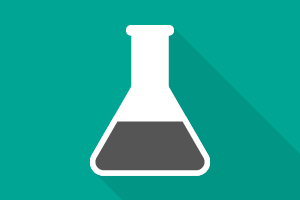Classroom Resources: Quantitative Chemistry
Filter by:
26 – 50 of 149 Classroom Resources
-

Heat of Neutralization, Acid Base Reactions, Exothermic & Endothermic, Temperature, Specific Heat, Calorimetry, Bond Energy, Net Ionic Equation, Molarity, Dimensional Analysis, Measurements, Mole Concept | High School
Lab: Heat of Neutralization Mark as Favorite (8 Favorites)
In this lab, students carry out an acid-base reaction to calculate the heat of neutralization based on experimental data. This lab will reinforce the concepts of exothermic and endothermic processes, system and surroundings, and heat of reaction (specifically, neutralization).
-

Limiting Reactant, Acid Base Reactions, Stoichiometry, Indicators, pH, Dimensional Analysis, Mole Concept, Measurements, Concentration, Molarity | High School
Lab: Acid/Base Stoichiometry Mark as Favorite (18 Favorites)
In this lab, students experience a limiting reactant and can physically see the difference in amounts of product generated. They also see which reactant is in excess.
-

Strong vs Weak, Titrations, Acid Base Reactions, Equivalence Point, Indicators, pH, Concentration, Molarity, Measurements | High School
Lab: Acid Base Reactions Mark as Favorite (9 Favorites)
In this lab, students will witness a reaction between an acid and base. One will be strong, and the other may be weak or strong--it's up to them to determine.
-

Chemical Change, Limiting Reactant, Classification of Reactions, Percent Yield, Stoichiometry, Concentration, Molarity, Mole Concept, Dimensional Analysis | High School
Demonstration: First Day Review Mark as Favorite (23 Favorites)
In this demonstration, students see evidence of a chemical reaction.
-

Limiting Reactant, Percent Yield, Stoichiometry, Balancing Equations, Net Ionic Equation, Concentration, Molarity, Precipitate, Solubility, Dimensional Analysis, Mole Concept, Observations, Graphing, Separating Mixtures, Identifying an Unknown | High School
Lab: White Lab Mark as Favorite (65 Favorites)
In this lab, students use molarity concepts to review limiting reactant concepts mathematically, conceptually, and graphically. They can then carry out a follow up investigation to identify an unknown using concepts learned in the first investigation.
-

Partial Pressure, Gas Laws, Ideal Gas, Molar Mass, Pressure, Measurements, Error Analysis | High School
Lab: Determination of the Molar Mass of Butane Mark as Favorite (10 Favorites)
In this lab, students will experimentally determine the molar mass of a gas, specifically butane (C4H10), by collection over water. This experiment is an inquiry based experiment for 2nd year chemistry or AP chemistry students who have previously collected an insoluble gas.
-

Titrations, Limiting Reactant, Acid Base Reactions, Indicators, Chemical Change, Equivalence Point, Stoichiometry, Balancing Equations, Chemical Change, Graphing, Error Analysis, Chemical Change, Error Analysis, Measurements, Concentration, Molarity | High School
Lab: Acid-Base Mole Ratio Mark as Favorite (18 Favorites)
In this lab, students study several concepts, including acid-base reactions, limiting reactants, and stoichiometry, by observing the contained reaction of acetic acid (diluted vinegar) with sodium hydrogen carbonate (baking soda) in an unconventional, cost effective titration.
-

Saturated vs. Unsaturated, Molecular Structure , Molecular Structure, Covalent Bonding, Lewis Structures, Interdisciplinary, Dimensional Analysis, Intermolecular Forces, Melting Point | High School
Lesson Plan: Dietary Fats Mark as Favorite (15 Favorites)
In this lesson, students will learn about the chemistry of dietary fats in the food they eat. They will calculate the number of calories coming from fats, carbohydrates, and proteins based on a food label before completing a guided activity focused on investigating the chemical structures of different types of fats. Students will then engage in a literacy component where they will use an article about the biological role of various types of dietary fats and foods to answer a series of questions.
-

Stoichiometry, Balancing Equations, Dimensional Analysis | High School
Lesson Plan: Stoichiometry of Air Bags Mark as Favorite (99 Favorites)
In this lesson, students will be introduced to the concept of gram to gram stoichiometry calculations. Students will be guided through a scenario regarding air bags and will be tasked with calculating the amount of gas (NaN3) that must be used to inflate a vehicle air bag to the correct size. Follow-up practice problems are also provided.
-

Introduction, Lab Safety, Chemical Properties, Physical Properties, Chemical Change, Physical Change, History, Separating Mixtures, Elements, Mixtures, Density, Measurements, SI Units, Significant Figures, Dimensional Analysis, Scientific Notation, Accuracy, Molecular Motion, Phase Changes | High School
Lesson Plan: The Chemistry Basics and Measurement Quick Start Unit Plan Mark as Favorite (82 Favorites)
This Quick Start Unit Plan includes all the materials that a teacher will need for the first 10 class meetings of the school year. Each day is outlined with teacher notes, and includes slide presentations as well as directions for demonstrations, activities and labs to use. The fundamental topics covered in the 10 days of lessons are: laboratory safety, laboratory equipment, experimental design, classification of matter, chemical properties, physical properties, chemical change, physical change, phase changes, separation techniques, dimensional analysis, unit conversions, factor label method, accuracy, precision, significant figures, and percent error calculations. This Quick Start Unit plan aims to help students to build a foundation of understanding, and master important topics before moving deeper into the chemistry curriculum.
-

Combustion, Chemical Change, Balancing Equations, Reaction Rate, Conservation of Mass, Conservation of Matter, Stoichiometry, Limiting Reactant, Chemical Change, Conservation of Matter, Conservation of Mass, Graphing, Error Analysis, Accuracy, Observations, Inferences, Interdisciplinary, Reaction Rate, Catalysts, Measurements, Mole Concept | High School
Lesson Plan: Clean Air Chemistry Mark as Favorite (29 Favorites)
In this lesson, students will learn about air pollution and some steps toward mitigating it. First, they will burn a candle and measure its mass and the concentration of CO2 over time. Students will discuss which data set they have more confidence in and why and then use stoichiometry to predict outcomes. Next, students explore incomplete combustion in a model-based worksheet that shows how a lack of O2 in the burning of fuels can produce air pollution. Students work together to interpret the models, define terms, and draw conclusions. Lastly, students work in groups using Lego models to illustrate how a catalytic converter works. They race “Nature” against catalysts “Palladium,” “Platinum,” and “Rhodium” to see what breaks down air pollution molecules fastest.
-

Dimensional Analysis, SI Units | High School
Lesson Plan: Dimensional Analysis and Unit Conversion Mark as Favorite (59 Favorites)
In this lesson, students will learn how to use dimensional analysis for unit conversion problems. They will then practice the skill on several chemistry-based conversion problems.
-

Stoichiometry, Dimensional Analysis, Mole Concept | High School
Lesson Plan: How to do Stoichiometry Problems Mark as Favorite (65 Favorites)
In this lesson, students learn templates for performing stoichiometry problems. They then put the methods to the test with a practice worksheet.
-

Percent Composition, Ideal Gas | High School
Lesson Plan: Investigating Popcorn with the Ideal Gas Law Mark as Favorite (38 Favorites)
In this lab, students will collect data to determine the pressure inside a popcorn kernel when it pops using the Ideal Gas Law. They will also calculate the percentage of water present in the average popcorn kernel. This resource includes two versions of the student activity, traditional and inquiry.
-

Measurements, Significant Figures, Accuracy, Error Analysis, Intermolecular Forces, Accuracy, Error Analysis | High School
Lesson Plan: Fit for Consumption? Mark as Favorite (7 Favorites)
In this lesson, students will learn about a product recall of baby formula. Students will explore regulations around foods for human consumption and the quality control process that is part of food production. They will use their knowledge of the difference in intermolecular forces between solids and liquids to determine the moisture content in samples of powders. Students will then assume the role of quality control technicians and write a report in which they provide a data-informed decision as to whether their batch should be discarded or is fit for consumption.
-

Measurements, SI Units | Middle School
Lesson Plan: Masters of Measurement Mark as Favorite (5 Favorites)
In this lesson, students will review the characteristics of metric measurement, and practice using measurement tools. They will then take on the role of an intern on the Zombie Prevention Task Force and use their measurement skills to develop a vaccine in an escape room activity.
-

Gas Laws, Ideal Gas, Volume, Temperature, Pressure, Kinetic Molecular Theory, Density, Graphing, Density, Chemical Change, Stoichiometry, Balancing Equations, Chemical Change, Dimensional Analysis | High School
Lesson Plan: The Gas Laws Unit Plan Mark as Favorite (99 Favorites)
The AACT high school classroom resource library and multimedia collection has everything you need to put together a unit plan for your classroom: lessons, activities, labs, projects, videos, simulations, and animations. We constructed a unit plan using AACT resources that is designed to teach the Gas Laws to your students.
-

Pressure, SI Units, Dimensional Analysis | High School
Lab: Investigating the Power of Air Pressure Mark as Favorite (4 Favorites)
In this lab, students will investigate air pressure through several short experiments. They will become more familiar with the concept of air pressure and its corresponding units of measurement. Students will be challenged to interpret their observations through modeling particle diagrams.
-

Stoichiometry, Balancing Equations, Classification of Reactions, Conservation of Mass, Limiting Reactant, Percent Yield, Dimensional Analysis | High School
Lesson Plan: Stoichiometry Unit Plan Mark as Favorite (125 Favorites)
The AACT high school classroom resource library has everything you need to put together a unit plan for your classroom: lessons, activities, labs, projects, videos, simulations, and animations. We constructed a unit plan using AACT resources that is designed to teach the concepts of stoichiometry and limiting reactants to your students.
-

Balancing Equations, Limiting Reactant, Stoichiometry, Dimensional Analysis, Mole Concept, Measurements | High School
Activity: S'more Stoichiometry Mark as Favorite (79 Favorites)
In this activity, students determine the number of graham crackers and chocolate pieces required to complete a “reaction” with a given quantity of marshmallows (the limiting reactant). They then use the same thought process with a problem involving a real chemical reaction.
-

Stoichiometry, Dimensional Analysis, Mole Concept | High School
Activity: A Stoichiometry Puzzle Mark as Favorite (134 Favorites)
In this activity, students will develop a better understanding of how to set up a stoichiometry problem using dimensional analysis (factor label method). Students will be able to use their prior knowledge of mole conversions and chemical reactions.
-

Limiting Reactant, Stoichiometry, Balancing Equations, Mole Concept, Dimensional Analysis, Molar Mass | High School
Activity: Sweet Stoichiometry Reactions Mark as Favorite (72 Favorites)
In this activity, students will use candy to investigate stoichiometry and mole-gram relationships in chemical equations, but could also be used to introduce the concept of limiting reactants.
-

Measurements, SI Units | Middle School
Activity: Jumping the Metric System Mark as Favorite (5 Favorites)
In this activity, students will become more familiar with using the metric system to convert units of measurement. Students then will then be challenged to redesign a school cafeteria tray using their understanding of metric system and unit conversion.
-

Molecular Structure, Intermolecular Forces, Measurements, SI Units | High School
Activity: Designing an Effective Respiratory Cloth Mask Mark as Favorite (62 Favorites)
In this activity students will use unit conversion to help compare sizes of molecules, viruses, and droplets and then use them to interpret graphical data. They will then use their findings to design a cloth mask that helps protect its wearer against infection by SARS-CoV-2, the coronavirus that causes COVID-19.
-

Scientific Notation | High School, Middle School
Activity: Scientific Notation Mark as Favorite (45 Favorites)
In this activity, students are actively involved in putting numbers into scientific notation and taking numbers out of scientific notation.